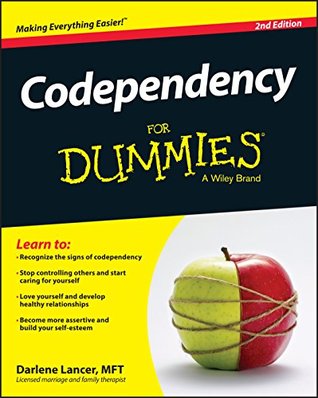More on this book
Kindle Notes & Highlights
It may be hard to admit that you’re human and make mistakes, and, in addition, that you’re powerless over your own recovery. Although a great deal of focus and effort is required to heal from addiction and codependency, you may be disappointed if you rely only on self-will. In fact, your will can get in the way. Sometimes, you won’t be able to discern whether or not you’re being controlling, whether or not you’re in denial, or whether or not your actions reflect good or poor self-esteem. Just when you think you’re doing great, you discover that all along you were in a major slip. The path of
...more
Rather than stay stuck in self-judgment and guilt, you admit, “Okay, I did (or said) that. Now, what am I going to do about it?” It’s also important to ask, “Whom did I hurt?” Don’t forget to put yourself at the top of the list because your self-judgment hurts your self-esteem. So does guilt, whereas taking responsibility and self-forgiveness improve your self-esteem and behavior.
You’re more likely to relapse if you’re not practicing adequate self-care and attending to your needs (see Chapter 8), including rest, recreation, exercise, inspiration, and emotional support (see Chapter 11). Not surprisingly, self-care is not only preventive, it’s also the remedy. Emotional support begins with you. Self-nurturing actually furthers your growth.
If I had to sum up my advice in healing from codependency in two words, it would be “Love Yourself.
Love yourself with gentleness and compassion. Modulate your inner voice so that it’s calm and kind. When you’re afraid or in pain, blaming yourself or thinking there’s something wrong with you makes matters worse. When you’re tempted to ignore your feelings and distract yourself with more activity, obsessions, or addictive behavior, practice just being with yourself. Be the one who is there for you with gentleness and compassion in your anxiety, sorrow, hopelessness, anger, and terror. The child within you needs you. Comfort yourself with all the tenderness you would a crying child or wounded
...more
Love yourself by expressing yourself. Your Self has been hidden too long. Healing shame requires that you risk being seen. Commit to stop hiding and honor yourself by communicating your feelings, opinions, thoughts, and needs. You have a right to think and feel what you do without explanation or justification. Your self-respect and the respect you receive from others will grow.
Every time you turn your attention back to yourself, you’re recovering by becoming your own center and master of your life. Mind your own business, and let other people live their lives.
Accepting reality is a step toward emotional health and maturity. Life is in constant flux and is unpredictable. But realizing this and deepening your relationship with your spiritual Self allow you to find security despite insecurity.
Developing trust is an evolving process. Often it follows these stages: Trusting a sponsor, therapist, or Twelve Step program (helps to center and calm you) Trusting God and/or your experience gained through meditation and reading spiritual material Listening to your feelings, inner guidance, and intuition Learning from experience and mistakes Trusting the process of risk, experience, and faith in yourself
Recovery means experiencing, naming, and allowing your feelings. If you stay with them, they ebb — like a passing cloud or stormy weather. If you run from them, they follow you, until you’re forced to feel or become numb. Feelings aren’t logical and don’t have to make rational sense. That doesn’t mean they’re less valid or significant. Journal daily. Describe the situation that’s bothering you and ask yourself how you feel about it.
Never ignore, minimize, or rationalize away your feelings — not just your emotions, but all your bodily sensations. Eat when you’re hungry, sleep when you’re tired, and wear a jacket when you’re cold. Don’t ignore your feelings and sensations because someone else has a different experience or disagrees. Your feelings are yours, valid, and unique. You have a right to your feelings without explanation. Don’t allow anyone to tell you how you “should” or “shouldn’t” feel — especially you! You’ve probably been doing that for years. Start honoring your feelings today.
Self-realization requires mindfulness of your feelings, values, needs, and desires and translating them into authentic action and honest communication.
When you react to someone else, you lose your power, and problems escalate. Rather than react (see Chapter 10), listen, think, feel, and respond. If you don’t know what to reply, say that you’ll think things over.


